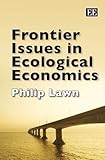Frontier Issues in Ecological Economics / by Philip Lawn
Material type: TextPublication details: UK: Edward Elgar Publishing Limited, 2007.Description: viii, 374p.; 24cmISBN:
TextPublication details: UK: Edward Elgar Publishing Limited, 2007.Description: viii, 374p.; 24cmISBN: - 9781845428402
- 337.7 LAW
| Item type | Current library | Call number | Status | Date due | Barcode | |
|---|---|---|---|---|---|---|
 Books
Books
|
Central Library | 337.7 LAW (Browse shelf(Opens below)) | Available | 000843 |
Browsing Central Library shelves Close shelf browser (Hides shelf browser)
Includes bibliographical references and index.
PART I: AN INTRODUCTION TO ECOLOGICAL ECONOMICS, SUSTAINABLE DEVELOPMENT AND THE STEADY-STATE ECONOMY
1. Introduction
2. What is Sustainable Development?
PART II: SUSTAINABLE DEVELOPMENT AND NATURAL CAPITAL
3. Is Human-Made Capital an Adequate Long-run Substitute for Natural Capital?
4. The Potential Conflict Between Sustainability and Welfare Maximisation
5. Natural Resource Prices and Natural Resource Scarcity
PART III: SUSTAINABLE DEVELOPMENT INDICATORS
6. An Introduction to Sustainable Development Indicators
7. An Assessment of Various Measures of Sustainable Economic Welfare
8. Using a Fisherian Measure of Income to Guide a Nation’s Transition to a Steady-State Economy
9. Eco-Efficiency Indicators: Theory and Practice
PART IV: SUSTAINABLE DEVELOPMENT: THEORETICAL AND POLICY ISSUES
10. On the Independence of the Sustainability, Distribution and Efficiency Goals
11. Ecological Tax Reform: Why and in What Form?
12. Does the Environmental Kuznets Curve Exist? A Theoretical Perspective
13. IS-LM-EE: Incorporating an Environmental Equilibrium Curve into the IS-LM Model
14. Reconciling the Policy Goals of Full Employment and Ecological Sustainability
PART V: SUSTAINABLE DEVELOPMENT AND THE INTERNATIONAL DIMENSION
15. Keynes, International Governance Arrangements and Globalisation
16. Increasing Sustainable National Income by Restoring Comparative Advantage as the Principle Governing International Trade
17. The 2002 World Summit on Sustainable Development: Another Opportunity to Address the Scale and Globalisation Issues Gone Begging
PART VI: CONCLUSION
18. Is a Steady-State Economy Compatible with a Democratic-Capitalist System?
Bibliography
Index
Ecological economics formally emerged in the late 1980s in response to the failure of mainstream economic paradigms to deal adequately with the interdependence of social, economic and ecological systems. Frontier Issues in Ecological Economics focuses on a range of cutting-edge issues in the field of ecological economics and outlines plausible measures to achieve a more sustainable, just, and efficient world for all.
Covering a broad range of key subjects, this book deals with some of the frontier issues that have recently emerged in ecological economics and those that continue to remain a source of disagreement and debate. In doing so, the book highlights the importance of natural capital, the limits to growth and markets in achieving sustainable development, the policy-guiding value of sustainable development indicators, ecological tax reform considerations, environmental-macroeconomic issues such as the reconciliation of the ecological sustainability and full employment objectives, and measures to deal with growing globalization concerns. The book concludes with the optimistic assessment that a transition to a steady-state economy – necessary to achieve sustainable development – is entirely compatible with a democratic-capitalist system.
Philip Lawn’s latest book will appeal to academics and researchers working in the areas of ecological, environmental and natural resource economics, sustainable development, green national accounting, environmental management and development studies. Policymakers, environmental managers and NGOs will also appreciate this book. ---provided by publisher
There are no comments on this title.








